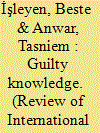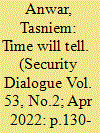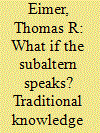| Srl | Item |
| 1 |
ID:
193303


|
|
|
|
|
| Summary/Abstract |
This article studies practices of knowledge production during counterterrorism financing court cases in European courts. Developments in international law have contributed to novel regulations to criminalise and prosecute the funding of terrorism in advance of terrorist violence. In this study, we study how court cases have become important spaces for contesting and evaluating multiple knowledge claims on terrorist threat and suspicion by analysing case proceedings from both the Netherlands and the United Kingdom. Building on recent debates in International Relations and postcolonial theory, we make two contributions. First, building on insights from postcolonial literature on ‘abyssal thinking’, we illustrate how legal practices differentiate between different ways of knowing by dismissing certain experiences as ‘emotional’ or ‘subjective’ in contrast to the assumed objectivity of other knowledge claims. We argue that decisions on what counts as knowledge in a court setting are situated in a specific sociopolitical setting, whereby particular knowledge and life-worlds are recognised at the expense of others. Second, we empirically show how the novel criminal laws shifts the responsibility to know terrorist threat from the state to ordinary citizens. We illustrate how the court reinforces new security logics where the state can entertain doubt, uncertainty, and trust in their practices, while the citizens cannot.
|
|
|
|
|
|
|
|
|
|
|
|
|
|
|
|
| 2 |
ID:
185182


|
|
|
|
|
| Summary/Abstract |
Calculating the potential risk of future terrorist violence is at the core of counter-terrorism practices. Particularly in court cases, this potential risk serves as legitimization for the preemptive criminalization of suspicious (financial) behaviour. This article argues that the preemptive temporality seen in such court cases is a practice of ‘sorting time’ and producing distinct legal definitions around future violence. Building on postcolonial and feminist scholarship on temporality, the article examines preemptive temporality as the material, embodied and multiple engagements with time that are enacted in terrorism court cases. Through the use of empirical data obtained from court observations, court judgements and interviews with legal practitioners, accounts of empirical temporalities are traced to illuminate other forms of violence that until now have been overshadowed by the dominant (and relatively unchallenged) perception of future terrorist threats that is enacted in the courtroom. In this way, the article makes two important contributions. First, it advances the theoretical debate on preemptive security through an examination of how legal and security practices co-produce temporality by defining future terrorist violence. Second, it contributes empirically by showing how temporality is constructed in multiple ways, paying specific attention to temporalities resisting dominating perceptions of future terrorist violence.
|
|
|
|
|
|
|
|
|
|
|
|
|
|
|
|
| 3 |
ID:
173908


|
|
|
|
|
| Summary/Abstract |
This article explores the success chances of subaltern political agency. Empirically, it investigates how indigenous groups can prevent unwanted access to their traditional knowledge regarding biological resources. The article compares indigenous politics in Brazil and India. Brazilian movements effectively defend regulations to deny the disclosure of their knowledge, whereas comparable demands of the Adivasis in India have remained fairly neglected. To explain these differences, the article connects the insights of social movements and postcolonial theories. It shows that a synopsis of both literatures helps to explain both the potential and the limitations of indigenous political agency.
|
|
|
|
|
|
|
|
|
|
|
|
|
|
|
|